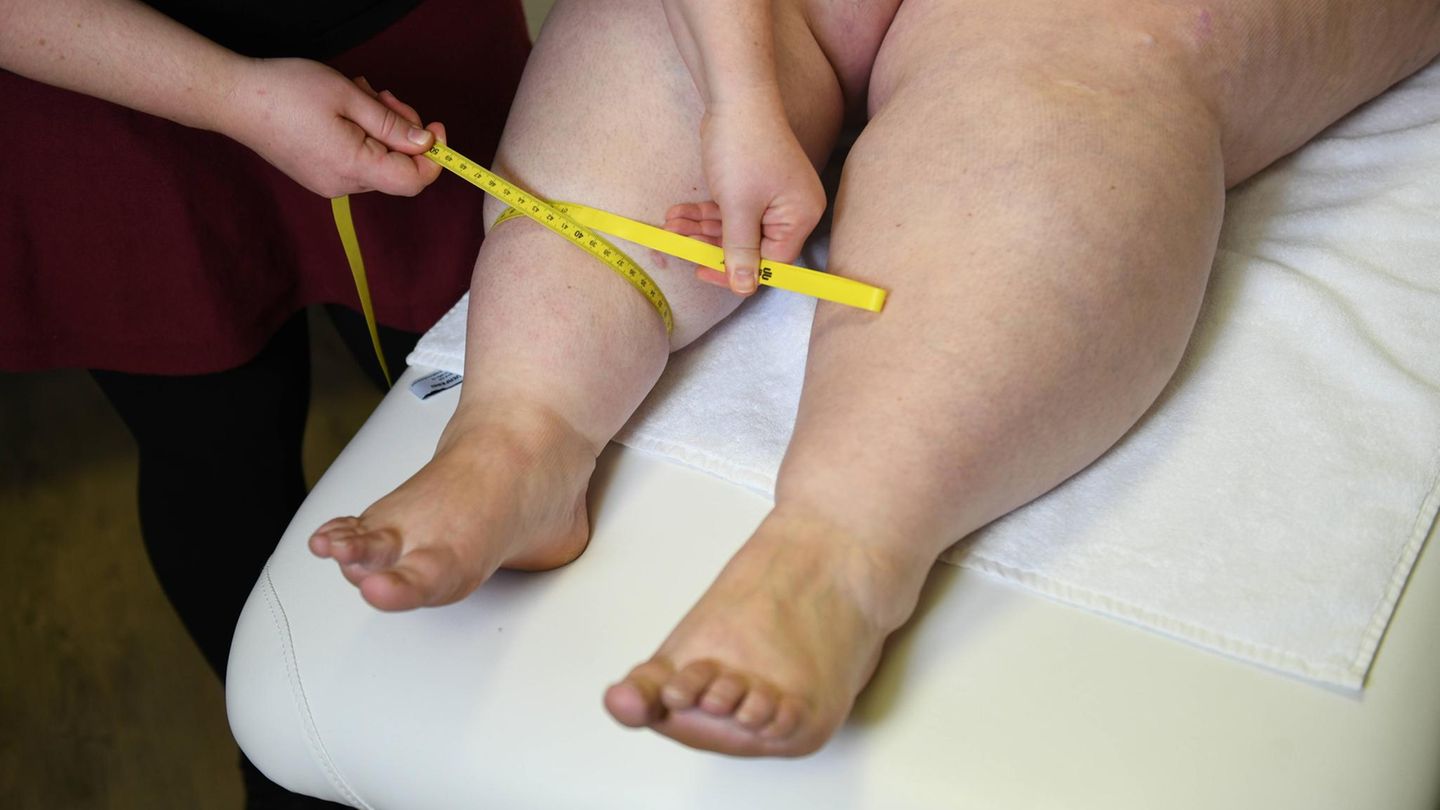For six years Annett Möller fought against severe panic attacks, which she kept secret. Today the moderator has found a way to deal with it and shares her experiences in a book.
As an RTL presenter, Annett Möller read the news for many years until everything changed with a broadcast about the 2009 federal election. In an interview with the stern the 43-year-old reveals that she suffered from severe panic attacks for years. As a coach and with her new book “Liebe Angst, Zeit that you go”, she would like to draw attention to the topic and help those affected.
Ms. Möller, can you describe the first panic attack?
That was completely unexpected. I went to the studio back then and wanted to be particularly good that day and thought to myself ‘Now you are moderating the news here in a really cool way’. So I started speaking in a deep voice, not my normal speaking voice. And then it really happened that I realized: But that was much too deep now. Because I was breathing so deeply at that moment, I couldn’t really breathe. That panicked me. Because I couldn’t escape the situation. I had three minutes of airtime, a news block in the afternoon, live. I had to go through this, but I couldn’t breathe, how am I going to get through this?
How did it feel
At that moment I saw my life go by and had palpitations, sweat attacks, dizziness and massive nausea. A real panic attack. I wanted to escape, but I also knew on the other side: If I flee now, if I leave this program now, then I won’t come back either. Not because of others, but because it is such a terrible experience, to have this fear of death, this fear of suffocating, that I would not have dared go there again afterwards.
Was there also a fear of the audience’s reaction behind this?
I knew from others, when they had a blackout, how they were treated in public. Everyone discussed it, made fun of it. So I kind of had to pull it off and clung to the table. Three minutes can feel like forever with that fear gripping you.
Was it over right after the show?
I really galloped through at a mad pace. I tried to read faster and faster so that I could get out of the situation. When the show was over, the director asked me via the button in my ear whether everything was okay with me or what was wrong. I couldn’t say ‘I just had a panic attack’ at the moment, but blamed it on a migraine attack. I was able to breathe again, but I felt miserable as a dog. I can’t even say how I mastered the main show that evening, I actually don’t remember that, I completely faded it out.
So did you know exactly what it was?
I know the normal excitement of a live broadcast. It’s a different kind of adrenaline rush. But in this case it was no longer a nice excitement that just comes with the job. It was just scared to death. However, if I hadn’t known what the adrenaline rush normally felt like, I could have thought, based on the symptoms – palpitations, sweat attacks – that something was seriously wrong with me. For example, that I have something close to my heart. I was also able to associate it with the wrong breathing, which at least helped to understand it to some extent.
What happened to you after this experience?
After that I had two weeks off, which had been planned in advance and I then thought, now I will recover and then I will go back to it again. But after the two weeks I realized that I was not recovered at all. I was exhausted and the thought was still there: what if the fear comes back?
And the fear was confirmed.
Then it actually came to the first broadcast after my vacation. And I’ve sat on the toilet before, cried and tried to calm myself down with breathing exercises. I still remember sitting in the chair in the studio and looking to my left at my co-host for the sport, turning back, and at the moment I was caught as I feared it would. There were only two options for me: stay seated and pull it through somehow or pass out from the chair. But then, I knew, I would probably no longer be able to host this show ever again.
Did the fear only arise when faced with professional challenges or also in private situations?
In the bad times also in private life. There were situations when I sat on the sofa and noticed that the fear was coming. Then it happened in quick succession. Sometimes it felt like it took me all day to get from the bedroom to the living room because I stopped walking or literally crawled across the floor on all fours. I was totally exhausted.
What did that do to you emotionally?
I have always been a doer, my mother set an example for me, she always tackled everything, rolled up her sleeves and got started. And that’s how I always was. I always wanted to jump into the deep end and I had fun doing it. And suddenly I couldn’t move forward. Suddenly I was just a little bit of misery and was no longer myself and that was also a blow in the pit of my stomach.
When you realized you had to do something, what was the first step?
I had therapy that lasted about twelve sessions and was also with a neurologist / psychiatrist. In addition, I have read an incredible number of books and researched on the Internet. I’ve done everything from hypnosis to family constellations.
Which exercises have been successful?
Progressive muscle relaxations have brought me a lot. I started meditating and walking. I concentrated on being very aware of every step, how the foot rolls, how the body moves, looking, perceiving the nature around me. How does the wind blow, what do I smell, what do I feel. To perceive with all your senses what is happening in order to stay in the here and now. When fear comes, it is the thoughts that make you so bothered. And a special step was, for example, really accepting the fear, even if I didn’t want it.
In your book you mention the inner child more often. What’s it all about?
We all have different personality parts in us. The inner critic, the inner parents or, for example, the inner child. That is the part in which our childhood experiences are stored. Today we subconsciously compare what we experienced in our childhood with new experiences.
What could you find out about yourself?
That part of my personality is little Annett, who was very hurt as a child. I didn’t feel heard or loved. Especially from my father. And that still gnawed at me back then. When I got into situations that I subconsciously compared to them, I felt terrible. Because I felt helpless. Realizing that this part of me exists was very important.
What do you do when you are aware of the inner child?
You find out what the inner child needs. What does it wish for? Why does it feel that way in the situation? In my case: Why does it all come up in me and trigger this fear?
The feeling of not being enough and the impression that somehow you always have to give more?
Yes, exactly. Unfortunately, I didn’t have such a good childhood in terms of my relationship with my father. I took the feeling of not being enough and of not being loved with me into adult life. Realizing that was a giant leap: I can only help myself. Nobody can fill this void for me and heal the pain. You have to do it yourself. And you have to learn to forgive and free yourself from it all.
Very few people probably know what a family constellation is all about. Can you explain that?
In a family constellation that comes from family therapy, the clients are able to show the relationships and their interactions within a family. People present take on the role of individual family members according to the client’s specifications. It is a crazy dynamic that arises and that can help enormously to get a new perspective on problems. I would always recommend a systemic family constellation.
I wanted to know why my father was the way he was and I put the whole family on my father’s side. The answers to my questions may not have been what my father would give them, but I realized that he could only act as he did. Because he has also experienced it that way in his family. That helped me to get a new understanding.
How much does the past have to do with panic and fear in the present?
For me a lot. Of course, panic or fear always has some cause. So that one should ask oneself: What is fear trying to tell me? What does she want from me? Fear is a part that has a right to be there. He doesn’t want anything bad for you, he wants to tell you something. It’s about finding out what that is.
What would be the first tip you would have for someone who is acutely affected?
Of course, you should contact your family doctor to rule out other illnesses and then talk to therapists, especially at the beginning when you cannot classify it yourself. But then it means: accept the fear, accept, accept and really say: It’s okay. I allow it now. Of course it’s not nice and it’s not easy at the moment, but I allow it now. The fear may be there, because the more we defend ourselves against it, the harder it becomes.
I am a 24-year-old writer and journalist who has been working in the news industry for the past two years. I write primarily about market news, so if you’re looking for insights into what’s going on in the stock market or economic indicators, you’ve come to the right place. I also dabble in writing articles on lifestyle trends and pop culture news.




